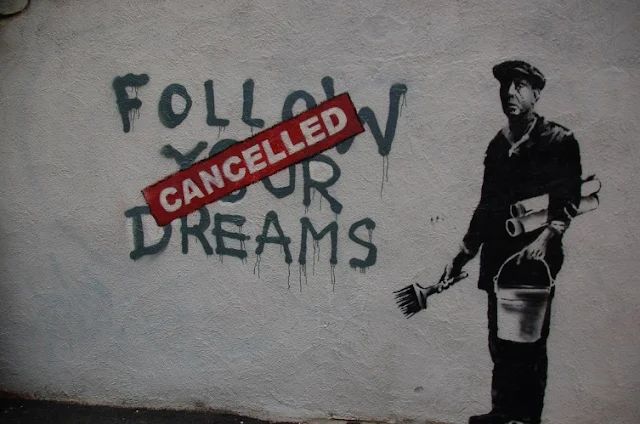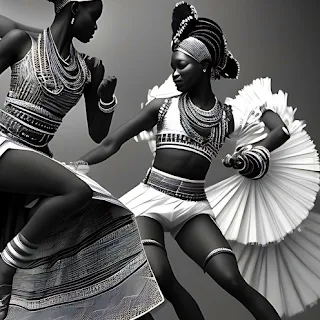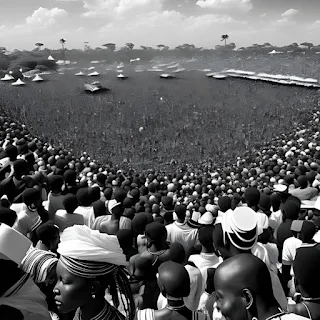Party in Togo at Vibrant Festivals
Togo is a small African country with seven major celebrations and festivals taking place throughout the year so the party never ends.
TheEpe-Ekpe Ancestry festival,Evala wrestling tournament, Fetes des Tabaski sacrifice celebration, Fetes de Yennenga cultural festival, Fetes des Moissons Harvest festival, Fetes des Esprits voodoo festival, and the Togo Independence Day.
Togo is a small country located in West Africa, learn about Togo's festivals and celebrations, The shape of the country and the land size compared to the US, and the five different environmental regions in Togo.
Seven major festivals and celebrations that take place in Togo.Togo is a culturally rich country with a diverse mix of ethnic groups, and as such, it has seven festivals and celebrations that are unique to its people.
Epe-Ekpe Festival.
Epe-Ekpe is a traditional festival celebrated by the Guin ethnic group in the town of Glidji, Togo. It is a festival that celebrates the annual renewal of the covenant between the people and their ancestors. The festival is characterized by colorful processions, drumming, dancing, and animal sacrifices. The festival is held annually in the month of January. It is a time for people to come together to pray for their ancestors and to ask for their blessings. The festival is also a time for people to celebrate their culture and heritage.
The festival begins with a procession of people carrying offerings to the spirits. The offerings usually include food, drinks, and animals. The procession is led by a priest or priestess who chants and dances. Once the procession reaches the altar, the priest or priestess performs a sacrifice. The sacrifice is usually an animal, such as a goat or chicken. The blood of the animal is then sprinkled on the altar. After the sacrifice, there is a feast.
The food and drinks that were offered to the spirits are shared by everyone. There is also dancing and singing. The festival continues until late at night. Epe-Ekpe is an important festival for the people of Togo. It is a time for them to come together to celebrate their culture and heritage. It is also a time for them to pray for their ancestors and to ask for their blessings. The festival is also a time for young men to be initiated into the Epe-Ekpe society. This is a secret society that is responsible for upholding the traditions and customs of the Guin people. The initiation process is long and arduous, and it is only after the young men have completed the process that they are considered to be full members of the society.
The Epe-Ekpe society is a powerful force in the lives of the Guin people. It is responsible for maintaining order and discipline in the community, and it also plays an important role in the resolution of disputes. The society is also responsible for organizing the Epe-Ekpe festival, and it is the members of the society who are responsible for leading the processions, performing the sacrifices, and organizing the feast. The Epe-Ekpe festival is a colorful and vibrant event that celebrates the culture and heritage of the Guin people. It is a time for people to come together to pray for their ancestors and to ask for their blessings. It is also a time for young men to be initiated into the Epe-Ekpe society, which is a powerful force in the lives of the Guin people.
Evala Festival.
This is a wrestling festival held annually in several towns in northern Togo, including Kara, Sokodé, and Bafilo. The festival is a traditional rite of passage for young men, and it involves a series of wrestling matches between the participants and it is a time for them to test their strength and courage. The festival is also a time for celebration and community.
The Evala Festival is held in the month of July, and it lasts for several days. The tournament is held in a large arena, and it is attended by thousands of people. The wrestlers are divided into two teams, the Whites and the Reds. The wrestlers wear traditional attire, and they are covered in mud and oil. The wrestling is fierce, and the wrestlers often sustain injuries.
The Evala Festival is a colorful and vibrant event that celebrates the culture and heritage of the Kabye people. It is a time for people to come together to celebrate their youth and their strength. It is also a time for them to reaffirm their ties to their community.
Fetes des Tabaski Festival.
Also known as Eid al-Adha, this Muslim festival is celebrated all over Togo. Fetes des Tabaski is a Muslim festival celebrated all over Togo. It commemorates the willingness of Ibrahim to sacrifice his son as an act of obedience to Allah. On this day, Muslims sacrifice a ram, goat, or cow and share the meat with family, friends, and the needy.
The festival is held annually in the month of Dhu al-Hijjah, which is the 12th month of the Islamic lunar calendar. The date of the festival changes each year because the Islamic calendar is based on the lunar cycle, which is shorter than the solar year. The festival begins with a special prayer service at the mosque. After the prayer service, Muslims slaughter a sheep or goat. The meat is then divided among family, friends, and the needy.
Fetes des Tabaski is a time for celebration and feasting. Muslims dress in their best clothes and visit with friends and family. There is also a lot of food, including traditional dishes such as couscous, tagine, and baklava. The festival is also a time for charity. Muslims are encouraged to give to the poor and needy. This is seen as a way of showing gratitude to Allah for His blessings.
Fetes des Tabaski is a joyous occasion that brings together Muslims from all over the world. It is a time for celebration, feasting, and charity. It is also a time to remember the importance of family and community.
Fetes de Yennenga Festival.
This festival is celebrated by the Gurunsi people in the town of Bassar. It honours Yennenga, a legendary warrior princess who founded the Mossi Empire. The festival features cultural displays, traditional dances, and drumming. Fetes de Yennenga, also known as the Festival of Yennenga, is a traditional festival celebrated by the Mossi people of Burkina Faso. It commemorates the founding of the Mossi Kingdom by Yennenga, a young woman who was abandoned by her father and raised by a buffalo. The festival is characterized by horsemanship, dancing, and the sharing of food and drinks.
The festival is held annually in the month of March. It is a time for people to come together to celebrate their culture and heritage. The festival is also a time for them to give thanks for the bountiful harvest and to pray for a good year ahead. The festival begins with a procession of people carrying baskets of food and drink. The procession is led by a priest or priestess who chants and dances.
Once the procession reaches the village square, there is a feast. The food and drinks that were carried in the baskets are shared by everyone. There is also dancing and singing. The festival continues until late at night. The highlight of the festival is the horsemanship competition. Young men from all over the kingdom compete in a series of races and obstacle courses. The winner of the competition is awarded a prize, such as a cow or a goat.
Fetes de Yennenga is an important festival for the people of Burkina Faso. It is a time for them to come together to celebrate their culture and heritage. The festival is also a time for them to give thanks for the bountiful harvest and to pray for a good year ahead. The festival is also a time for young people to find a spouse. The young people dance together and get to know each other. If they like each other, they can get married after the festival.
Fetes de Yennenga is a colorful and vibrant event that celebrates the culture and heritage of the Mossi people. It is a time for people to come together to celebrate their hard work and to give thanks for the bountiful harvest. It is also a time for them to socialize and to strengthen their ties to their community.
Fetes des Moissons Festival.
This is a harvest festival celebrated by the Kabye people in the town of Kpalimé. It marks the end of the farming season and the beginning of the harvest. The festival is characterized by dancing, singing, and the sharing of food and drinks.Fetes des Moissons is a harvest festival celebrated by the Kabye people in the town of Kpalimé, Togo. It marks the end of the farming season and the beginning of the harvest. The festival is characterized by dancing, singing, and the sharing of food and drinks.
The festival is held annually in the month of November. It is a time for people to come together to celebrate their hard work and to give thanks for the bountiful harvest. The festival is also a time for people to socialize and to strengthen their ties to their community. The festival begins with a procession of people carrying baskets of food and drink. The procession is led by a priest or priestess who chants and dances.
Once the procession reaches the village square, there is a feast. The food and drinks that were carried in the baskets are shared by everyone. There is also dancing and singing. The festival continues until late at night. Fetes des Moissons is an important festival for the people of Togo. It is a time for them to come together to celebrate their culture and heritage. It is also a time for them to give thanks for the bountiful harvest and to pray for a good year ahead.
The festival is also a time for young people to find a spouse. The young people dance together and get to know each other. If they like each other, they can get married after the festival. Fetes des Moissons is a colorful and vibrant event that celebrates the culture and heritage of the Kabye people. It is a time for people to come together to celebrate their hard work and to give thanks for the bountiful harvest. It is also a time for them to socialize and to strengthen their ties to their community.
Fetes des Esprits Festival.
This is a voodoo festival celebrated in several towns in Togo, including Lomé, Glidji, and Togoville. It honours the spirits of the ancestors, and it involves animal sacrifices, dancing, and singing. The festival is held annually in the month of October. It is a time for people to come together to pray for their ancestors and to ask for their blessings.
The festival is also a time for people to celebrate their culture and heritage. The festival begins with a procession of people carrying offerings to the spirits. The offerings usually include food, drinks, and animals. The procession is led by a priest or priestess who chants and dances. Once the procession reaches the altar, the priest or priestess performs a sacrifice.
The sacrifice is usually an animal, such as a goat or chicken. The blood of the animal is then sprinkled on the altar. After the sacrifice, there is a feast. The food and drinks that were offered to the spirits are shared by everyone. There is also dancing and singing. The festival continues until late at night. Fetes des Esprits is a important festival for the people of Togo. It is a time for them to come together to celebrate their culture and heritage. It is also a time for them to pray for their ancestors and to ask for their blessings.
Togo Independence Day.
Togo gained independence from France on April 27, 1960. Togolese Independence Day is a public holiday in Togo and is celebrated with parades, speeches, and cultural displays. There are usually parades in the capital city of Lomé and other major cities. These parades feature marching bands, floats, and traditional dancers, speeches by government officials and other dignitaries. These speeches focus on the importance of independence and the need for unity and progress. There are also usually cultural displays, such as traditional music and dance performances. These displays showcase the rich culture and heritage of Togo along with sports events, such as football matches and athletics competitions. These events are a chance for people to come together and celebrate their national pride.
Did you know?
Togo’s shape is similar to a rectangle with a protrusion on the eastern side, which is the country's easternmost point. Togo is a relatively small country in Africa. It is located in West Africa and is bordered by Ghana to the west, Burkina Faso to the north, and Benin to the east.
In terms of land area, Togo is the 122nd largest country in the world and the 39th largest country in Africa. To give you an idea of its size, Togo covers an area of approximately 56,785 square kilometers (21,925 square miles). This is about the same size as the US state of West Virginia, and slightly smaller than the US state of Kentucky.
More links to articles you will find thought provoking.
-
That African Fabric You're Wearing Isn’t African

-
About neck elongation rings

-
Lighthouses of Egypt and Morocco

-
Mental Illness in Africa Taboos

-
Kente cloth inspired by a spiders web









